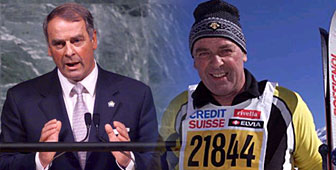Adolf Ogi: A controversial man of the people

The Swiss defence minister and this year's president, Adolf Ogi, has had a highly colourful and controversial career in cabinet.
To some, Ogi was an optimist whose heart beat for Switzerland. A man close to the people, who fought to end Switzerland’s isolation but found himself increasingly at odds with his own rightwing-dominated Swiss People’s Party.
To others, he was breath of fresh air in the cabinet – a man from the countryside, rather than from a city; a man without a university education; a keen sportsman turned politician.
In truth he was all of these.
Just two months ago, the United Nations secretary-general, Kofi Annan, went on a two-day walking tour with Ogi, starting in his home town, Kandersteg. It was typical of Ogi – a man relishing the international stage, but staying close to his roots.
Ogi told journalists he was leaving office at the “highpoint of his political career”. It was, as he admitted, a career with highs and lows. Those lows included political and personal disappointments, particularly in the 1990s.
He pinned his political colours to the mast as a figure of integration before a key vote in December 1992 on membership of the European Economic Area. Not only did the Swiss government lose the vote, but Ogi lost many allies within his People’s Party.
It was a crisis that continued to dog him. The powerful Zurich-based right wing of the party often called his membership of the party into question, as he fought to end Switzerland’s isolation.
Ogi, the perennial optimist, occasionally fell flat on his face. Critical comments about the crisis in the Balkans cost him the opportunity to reach his cherished goal of becoming foreign minister in 1995. Instead, he took on the defence portfolio.
His period as defence minister encapsulated his difficulties. He sought successfully to end Switzerland’s isolation, taking the armed forces into Nato’s Partnership for Peace programme, and working to ensure that armed soldiers could be sent abroad on international missions.
At the same time, the right wing accused him of compromising Switzerland’s neutrality. And he was faced with a series of corruption scandals within his department, some of which were inherited from the time of his predecessor.
Ogi was also well known for his sense of fun: he understood the value of humour in politics – as energy minister he advised the Swiss public how to save energy when they cooked eggs.
His down-to-earth nature meant he also understood the value of talking directly to the people. He coined the phrase “Freude herrscht” (“Happiness for everyone”) when a Swiss astronaut went into space for the first time in 1993, and he gave regular interviews and wrote columns in the tabloid “Blick” newspaper.
To his critics, he was something of a joke, struggling to master different languages or trying to give Switzerland a larger-than-life profile in the international arena. Indeed, books of collected jokes about Ogi, culled from the defence ministry, were hot sellers.
But it was on the international stage that Ogi reached his high point. In one week alone this year, Ogi became the first Swiss president to address the United Nations General Assembly in New York, he went to China to celebrate the 50th anniversary of Sino-Swiss diplomatic relations, and from there proceeded to Sydney for the Olympic Games.
His origins in the Bernese Oberland were never far from his thoughts or politics. He took many international politicians to Kandersteg, including the late French president, Francois Mitterrand.
His next guest to Kandersteg will not be long in coming: in two weeks’ time, Prince Charles will visit Ogi in his home town on a private visit.
by Ron Popper

In compliance with the JTI standards
More: SWI swissinfo.ch certified by the Journalism Trust Initiative
You can find an overview of ongoing debates with our journalists here . Please join us!
If you want to start a conversation about a topic raised in this article or want to report factual errors, email us at english@swissinfo.ch.